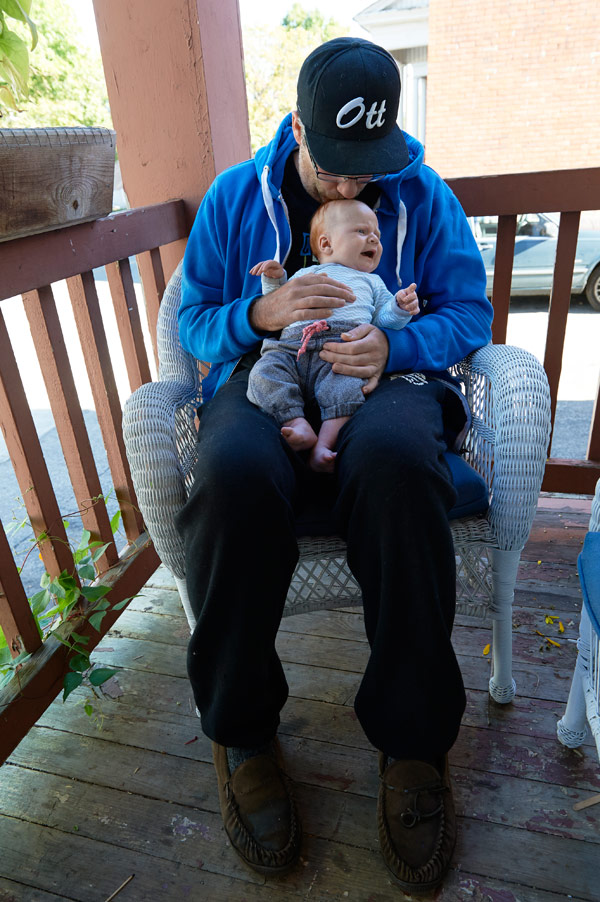New Life/Impending Death
"When I got the news, I didn't think they were talking about me.It didn't seem like life or death at that point."
"All my symptoms seemed to progress more quickly. It was as if my body had been given permission to fall apart."
"There isn’t a single test for ALS, how it’s diagnosed is the process of elimination. So basically from that point they began testing me over the span of about two months: blood, urine, MRIs, CT scans, trying to rule out any potential tumors or Lyme disease or lead poisoning, HIV, the whole gamut of potential neurological diseases."
"The last 20 years I’ve focused on one sole trade, and that’s metal working. I just loved it from the moment I tried it, from that moment I knew exactly what I’d found and I thought it was the best thing ever, such a good use of your energy."
"Losing all strength in my hands and arms to begin with and not being able to create in a medium that I’m familiar with feels kind of like you’re choking basically. You have stuff you want to get out there but you have no avenue to express it. You have no avenue for output."
"In the 20 years that I’ve been welding, I’ve basically wanted to keep going from one thing to the next. Welding and work was my one true love for sure. Just go, go, go, I loved it. I was making money and I was creating and the shop is right there… And I’m not doing that anymore."
"I’ve let my work speak for me my whole life, and I’ve never wanted to be in the limelight, so I was reluctant of Peter’s initial request but basically, as the video says, I’m in need of some help from my friends and that’s where this real idea of community and rallying around someone seemed so appealing to me."
Alan Gustafson, 38, Ottawa
| Still from video |
"[Al] is the most helpful guy you will ever meet. Now, he can't lift a glass of water. It's pretty sad."
"[The fundraising support from the community has been] absolutely incredible. He's not one to ask for a handout."
"He had been keeping this secret for two weeks trying to come to grips and this was the moment where he was like ‘OK I can’t keep it in any longer’ …We basically sat on my front porch and he told me through heavy tears that he’s been diagnosed with ALS and he did not have long to live."
"People dream of a response like $50,000. It is incredible. People heard [about Alan] and they all jumped in. There are local artisans that are donating a percentage of their sales to Al and his family. There are people that don’t have a job right now and they still donated, and there were people who didn’t even know Al and were still moved by the story that they donated. I’m just blown away by how many people care so much about this guy and his family."
Peter Joynt, Gustafson friend, Ottawa
Al Gustafson's imagination could never have foretold in his wildest nightmare, just as he and his wife were expecting their first child, that he would not be around to help to raise the little boy. He will be with him in his early formative years, no longer. So, he is doing what he can, treasuring this brief time that fate has given him to share life with a loving wife and a child their union brought them. That time really is brief. Not for him the reprieve given by nature to the world's most famous ALS sufferer.
Theoretical physicist Stephen Hawkins was diagnosed with the dread amyotrophic lateral sclerosis disease (often known as Lou Gehrig's disease) when he was only 21, and the expectation that he had only four more years at most to live was confounded by the reality that he is now 73 years old. His neurological deterioration had been slow. Not so for Alan Gustafson. He was being nagged by an unusual feeling in his neck and his arm which he attributed to a back problem. So he went for a medical diagnosis.
It took six months of tests and verification for the diagnosis to be delivered. And it was a stunner. He was given the facts, that his voluntary muscle movement was impaired by the onset of ALS which would eventually completely paralyse him, resulting in respiratory failure, and he might have between three to five years to live. A month after that diagnosis, he and his wife Jessica had good news; the birth of their child. Meanwhile, his neuron-motor ability to function swiftly deteriorated.
In six months' time from the diagnosis the use of his hands and arms have been denied him. He is only able to shuffle short distances on his own; mobility compromised. And he can no longer work. His wife is self-employed as a consultant, with no benefits. The expenses for home modification, electric wheelchair and an accessible van created vast difficulties for the young family. And this is where his lifelong friend Peter stepped in.
To create a fundraising on behalf of his old friend. A website to raise funds for the family which was initiated in September with the hope that $20,000 might be donated over a six month period. To their amazement it took two days to achieve that hoped-for amount. In two months' time the total had risen to $100,000 and the total now stands over that, while the revised hoped-for final total is now $150,000.
 |
| Alan Gustafson and his son Harvey. Photo by Ellen Bond |
Labels: Health, Social Welfare


























